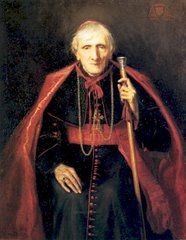Philippians 4:4-9 (Revised Standard Version, Catholic Edition)
"Rejoice in the Lord always; again I will say, Rejoice. Let all men know your forebearance. The Lord is at hand. Have no anxiety about anything, but in everything by prayer and supplication with thanksgiving, let your requests be made known to God. And the peace of God, which passes all understanding, will keep your hearts and minds in Christ Jesus.
Finally, brethren, whatever is true, whatever is honorable, whatever is just, whatever is pure, whatever is lovely, whatever is gracious, if there is any excellence, if there is anything worthy of praise, think about these things. What you have learned and received and heard and seen in me, do; and the God of peace will be with you."
1.) Visible joy and peace radiating from the interior working of grace provides testimony to the goodness and beauty and truth of what God has begun in us. We are the apologetic if we would only be it, but only through prayer and contemplation.
2.) Our inability to be these people of profound peace and radiating joy is frequently linked to the anxiety of being too busy to find that peace, even at times being too busy doing good things for God and neighbor. Our service cannot be disconnected from our Source.
3.) All the whatevers that St. Paul instructs us to think upon are not a call to merely present a reactionary defense. Too often, we can get caught up in presenting the apologetic response without really knowing the things that we are defending. These whatevers St. Paul names are worth contemplating in and of themselves. They should not only be given thought after they are attacked. They are at the core of how we worship God with all our minds.
4.) Thinking on these whatevers means reducing the clutter of our minds. To properly give our attention to these things, other attentions must be lessened, and perhaps in some cases dropped. Much of this clutter is the consumed garbage of pop culture. We should certainly have a discerning eye for the culture, trying to find the redemptive clues in it. But this cannot be a defense for staying in chains to our addictions to it, at worst to its filth and at best to its mediocrity. We should question our reading, viewing, listening, and buying habits : are we consuming this to be informed so we can redeem society, is this just a harmless expression of playfulness that I should keep, is this something keeping me from turning my eyes to the highest things, or is this something that is making me into someone unlike Christ. The answers may be difficult to find, and they will sometimes require sacrifice, but the very questioning itself is a good and higher thing that will draw us closer to Christ.
5.) St. Paul is not afraid to tell his readers to consider his example and imitate it. That act is very humbling as it strips St. Paul of the appearance of being humble, but in this case the love of neighbors in need of example trumps the love of self and the spiritual pride one can take in being thought humble. St. Paul's life, as well as the lives of all the saints, can be viewed as apologetics reflecting the transcendent goodness, beauty, and truth of God. Our attention to the lives of the saints will aid in shaping our lives to conform to the image of Christ. As we move towards that holiness, we must also invite the world to imitate us, if not in our holiness, then at least in our struggle for it. For bad Catholics and honest scoundrels like we are apt to be, we can have a reasonable hope that the world will see the beauty and goodness of an underdog, seemingly outmatched pursuing a most beautiful and noble cause, hopeful nonetheless. So let us cast down smugness and self-righteousness, fears of being found out, and admit that the Christian life is hard, that we are not the best followers but we are following the best of the ages in the saints of old, the best of our lifetime in John Paul the Great and Mother Teresa and now in our Holy Father Pope Benedict, that we are being shaped by holy priests and consecrated persons and holy lay people, that as bad as we can be we will not give up hope that we will be like these radiant souls and that our neighbor can also. And as we learn their examples, contemplate them, confess them, we will imitate the saints in their imitation of Christ more closely.
Subscribe to:
Post Comments (Atom)






No comments:
Post a Comment